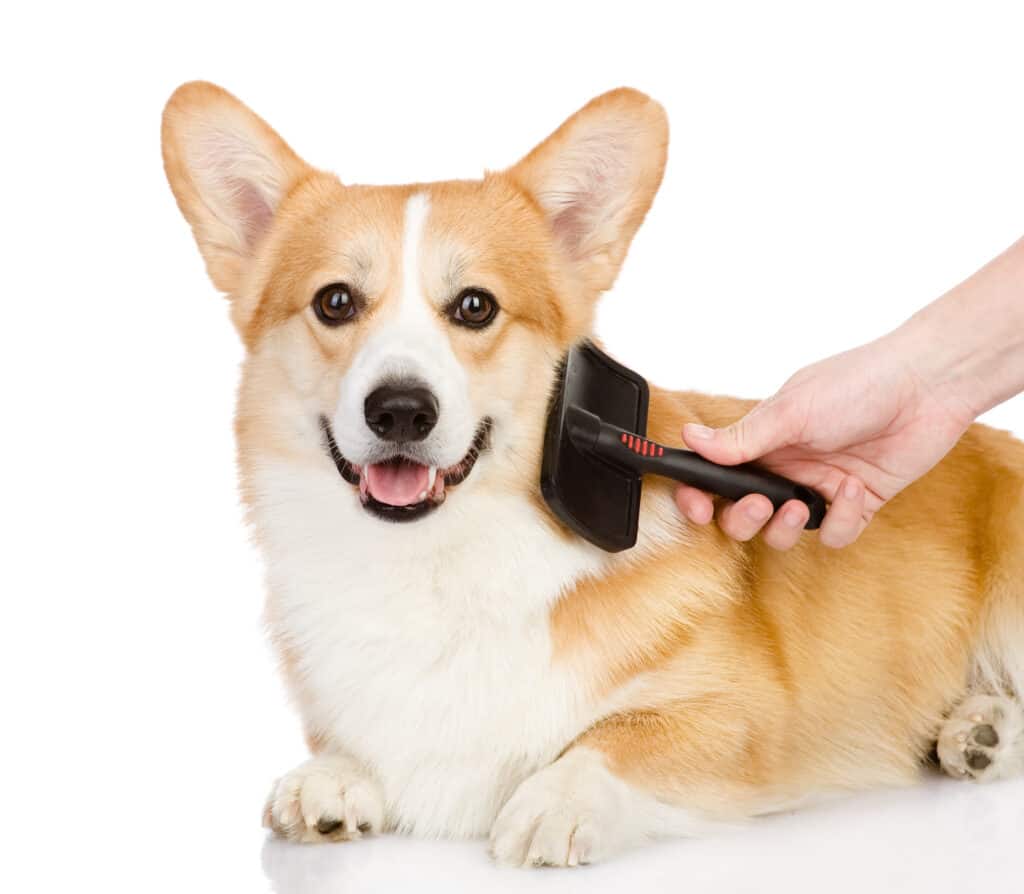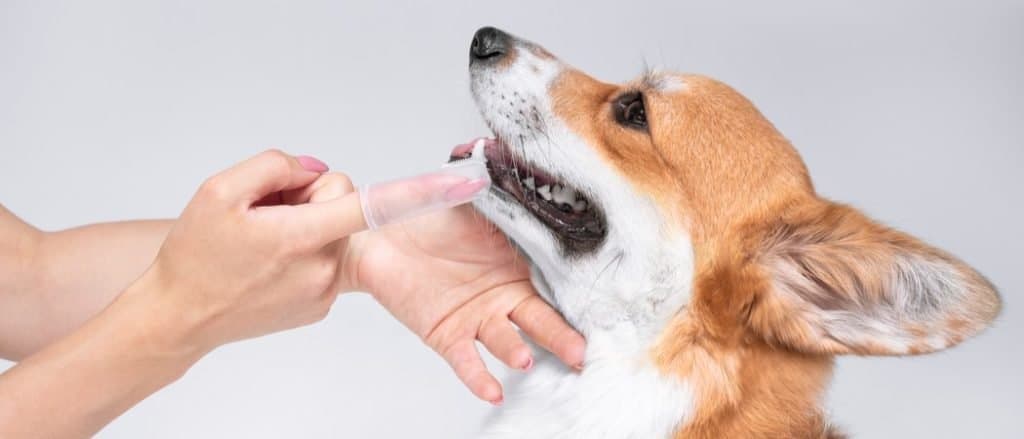Have you just adopted a corgi, or are you wondering about their grooming needs before getting one? Let’s talk about corgi grooming!
Properly grooming your corgi means brushing them weekly, bathing them and trimming their nails monthly, brushing their teeth daily, and cleaning their ears as needed. Corgis are shorthaired but do have double coats, which are important to manage in order to keep their coat and skin healthy.
In this article, we’ll discuss how to properly groom your corgi from start to finish, how often to complete each grooming task and more.
Brush Your Corgi Weekly

A slicker brush is a great grooming tool for your corgi.
©Ermolaev Alexander/Shutterstock.com
Corgis should be brushed weekly using a slicker brush and an undercoat rake. Most corgis will enjoy this process and may even ask to be brushed more often!
Since corgis are shorthaired, it’s okay to miss a grooming session here and there. However, brushing regularly will promote coat and skin health as well as reduce the shed fur you find around the house.
Baths Can Help Remove Dead Fur
Corgis should be bathed around once a month or as needed when they’re dirty or smelly. Treats can make bathtime a good experience for everyone! Lick mats that attach to the shower walls are great if you don’t have a helper to hand out treats while you do the actual bathing.
Use a shampoo made for dogs, not human shampoos or dish soap. These can be harsh on your corgi’s skin and can cause dryness and irritation if used consistently–though they’re typically okay in a pinch.
Rinse your corgi’s coat thoroughly down to the skin after shampooing. Rubbing your hands over the coat can help to lather any soap suds you might otherwise miss, making them more visible.
Make sure to dry them off before letting them outdoors in cold weather and before brushing their coat.
Brush Your Corgi’s Teeth Daily

Brushing your corgi’s teeth daily is one of the best things you can do for their overall health.
©Masarik/Shutterstock.com
An often-missed but vital part of dog grooming is brushing their teeth! Ideally, you’ll brush your corgi’s teeth every single day. Every other day can also work well since plaque hardens after two days.
Brushing your corgi’s teeth regularly helps to prevent dental disease, which is pricey to treat and can lead to a host of other health problems. Make sure to use dog toothpaste since human toothpaste is toxic to dogs.
You can use a human toothbrush, and there are also a variety of toothbrushes made just for dogs. You can keep it simple and cheap or try different types to figure out which works best for you.
If your corgi won’t allow you to brush their teeth, try slowly desensitizing them to the experience over time by taking slow steps. If your corgi bit you in the past or you think they may bite, work with a professional force-free trainer or dog behaviorist for this process.
You can also use dental hygiene products such as chews, dental treats, or water additives. Choose a Veterinary Oral Health Council (VOHC) approved product for the best results.
Trim Your Corgi’s Nails Monthly
Another monthly task is to trim your corgi’s nails. You can do this with traditional dog nail clippers, a dremel, or a scratch pad.
Make sure to learn about the anatomy of a dog’s nail before clipping so that you don’t cut into the quick. The quick is located at the base of the nail and is filled with blood. Cutting your dog’s nail too short will cause bleeding and pain and can make them more reluctant to put up with nail trims in the future.
It’s best to trim a little at a time until you’re comfortable knowing where to cut. Dremels and scratch boards reduce your risk of cutting too short as well!
If you’re uncomfortable trimming your Corgi’s nails yourself, you can also bring them to the groomer or vet monthly to have it done. They’ll usually charge a small fee.
Clean Your Corgi’s Ears as Needed
Lastly, check your Corgi’s ears each month. You’re looking for wax build-up as well as signs of ear infection such as redness, swelling, and odors.
If your Corgi’s ears are dirty, you can clean the outer ear with a damp cotton pad and ear cleaning solution made for dogs. Remember not to stick anything into the ear canal–if it seems excessively waxy, see your vet for a professional cleaning.
Also, see your vet if you notice signs of an ear infection. If your Corgi is prone to ear infections, your vet may recommend checking and cleaning the ears weekly rather than monthly.
The photo featured at the top of this post is © Nataba/iStock via Getty Images
Ready to discover the top 10 cutest dog breeds in the entire world?
How about the fastest dogs, the largest dogs and those that are -- quite frankly -- just the kindest dogs on the planet? Each day, AZ Animals sends out lists just like this to our thousands of email subscribers. And the best part? It's FREE. Join today by entering your email below.
Thank you for reading! Have some feedback for us? Contact the AZ Animals editorial team.






